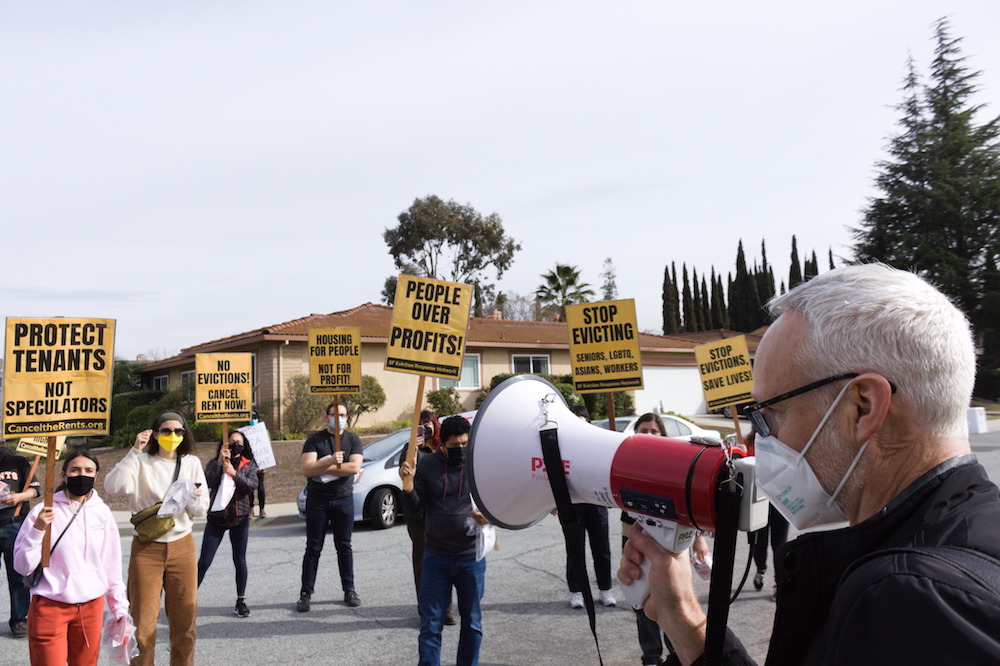Housing organizers from San Francisco and San Jose and residents of a rent-controlled 12-unit apartment building on 3661 19th Street facing eviction protested outside the San Jose home of Pierre and Tracy Malak, two co-owners of the building, who have attempted to evict all of the building’s residents twice under the Ellis Act since purchasing it in 2018 for $6.5 million.
Demonstrators implored the building’s owners to sell the building to a non-profit organization partnered with the Mayor’s Office of Housing and Community Development through the Small Sites Program, which offers landlords up to $300,000 per unit for eligible buildings and is praised by affordable housing advocates as a way to keep tenants in their buildings.

Paul Mooney, an 18-year resident of the 19th Street building and a longtime LGBTQ activist, said selling the building would be the most moral way to make money, as it allows tenants to stay in their homes.
“Selling it to a nonprofit through the Small Sites Program lets us all stay in our homes, and that’s the right thing to do…we hope to appeal to the goodness in their hearts,” Mooney said. “We don’t need more luxury housing in San Francisco, we need more affordable housing.”
The building is owned by two LLCs: 3661 19th Street LLC, managed by Pierre Malak and Jeff Pollack and VR Investments, managed by Ryan C. Fong.
Malak, a real estate agent, says on his web page bio for Realty One Group that he is in the “investor and flipper space of real estate” and “constantly on the hunt for great deals that are off market.”
Malak, Pollack, and Fong did not respond to requests for comment.
The second unlawful detainer filed against all of the building’s residents, which is the legal complaint used to evict tenants under the Ellis Act, was filed in October 2020. The Ellis Act allows for a 12-month postponement of eviction for elderly tenants, which kept residents of 3661 19th Street in their homes, but has since expired. Now, residents are fighting the eviction in court, represented by counsel from the Tenderloin Housing Clinic.
Under the Ellis Act, residents facing eviction are entitled to a relocation payment of $7,230.41 with an additional payment of $4,820.26 if they are disabled or over the age of 62.
Vincent Wong, who has lived in the 19th Street building for 22 years, said that the relocation payment is not enough to provide any security in San Francisco, due to the extremely high cost of housing relative.
“San Francisco is a very expensive place to live…I don’t think $7,000 makes a big deal in San Francisco,” Wong said.
In addition to protesting outside the Malaks’ home, residents and organizers approached neighbors of the building owners asking them to contact Pierre and Tracy Malak to convince them to sell the building through the Small Sites Program.
A woman who lives across the street from the Malaks and who asked to be identified by her last name only, said that she supports the idea of the building being acquired through the Small Sites Program, saying that it seemed more humane.
“If I was a seller, I would probably look to the more humane way of selling the building if it was comparable…you’d want to help tenants, I would not want to see people going homeless, especially elderly and disabled,” Hendricks said.
Other residents nearby expressed skepticism however, noting that acquisition by the city may result in less money than putting the building on the private market.
“If Pierre [Malak] is going to get more money for it, then I would probably go for it. I’m not sure what I would do. If I had a bunch of people talk to me like this, it might make a difference,” Ray Williams, who lives in an adjacent cul-de-sac to the Malaks, said.
When asked about the potential for the owners of the building to get less money selling the 19th Street building to the city instead of renting it at market-rate or selling it to a private developer, Wong, who cares for his elderly mother in his unit, said that the Malaks should sell to the city because eviction could wreak havoc on the lives of current tenants.
“It would keep people in their homes, it wouldn’t disrupt people’s lives…there’s elderly, there’s people of color, it would be very disruptive, just for a few bucks,” Wong said.






